#Gundam Tekketsu no Orphans
Explore tagged Tumblr posts
Text









Orga Itsuka + Blushing [1/?]
#orga itsuka#gundam tekketsu#gundam ibo#iron blooded orphans#gundam#mein giffen#ibo renaissance anyone? anyone?
26 notes
·
View notes
Text


#gundamgif#gundamedit#mobile suit gundam iron blooded orphans#gundam ibo#iron blooded orphans#g tekketsu#amida arca#lafter frankland#azee gurumin#idk how to tag edits for a holy shit 10 year old series#and is it even really shounen it's decidedly tv-ma#gundam#mobile suit gundam#♃.gif
38 notes
·
View notes
Text
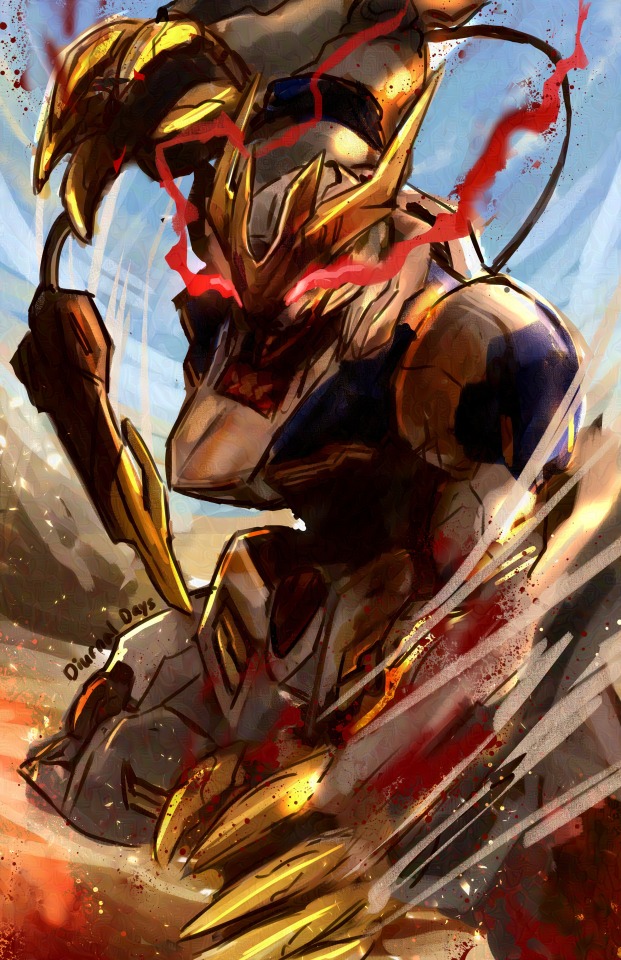
Bestial
#gundam barbatos#gundam iron blooded orphans#g tekketsu#mobile suit gundam#barbatos gundam#gundam#iron blooded orphans#鉄血のオルフェンズ#barbatos lupus rex
385 notes
·
View notes
Text

I did a thing
#mcgae#makugae#mcgillis fareed#g-tekketsu#gundam ibo#gundam iron blooded orphans#iron blooded orphans#kytriesart#rustal elion#almost forgot him lol
217 notes
·
View notes
Text
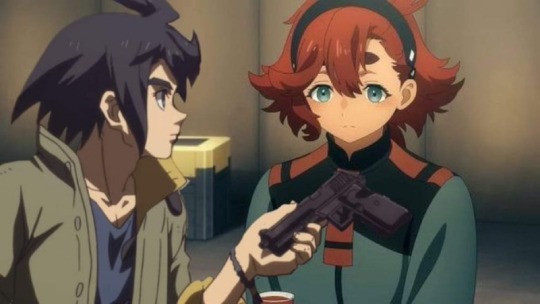
#stolen from twitter#which had stolen from Facebook#gundam#g witch#mobile suit gundam#the witch from mercury#mobile suit gundam the witch from mercury#suletta mercury#gundam the witch from mercury#g-witch#ibo#iron blooded orphans#mikazuki augus#g tekketsu
374 notes
·
View notes
Text

[rkgk] Mechadimension Neptunia — Grimgerde IF
#hyperdimension neptunia#choujigen game neptune#if#iffy#idea factory#compile heart#gundam#iron blooded orphans#tekketsu no orufenzu#grimgerde#mecha musume
27 notes
·
View notes
Text
The Devil That Is Capitalism
Content Warning: this post is going to potentially be talking about a whole smorgasbord of dicey topics including child abuse, child sexual abuse, child soldiers, war crimes, death, fates worse than death, politics, militarism, casual mention of suicide, and, of course, capitalism.
Also Spoiler Warning for Mobile Suit Gundam: Iron-Blooded Orphans
Reader discretion is advised.

Mobile Suit Gundam has always been a series about the horrors of war. To me, though, one of the more fascinating things about the series is that a lot of the wars in the various timelines stem from some form of unchecked capitalism. Though I haven't watched every series in the franchise yet, I do think one series in particular stands out in its portrayal of capitalism and its woes: 2015's Mobile Suit Gundam: Iron-Blooded Orphans. Strap yourselves in, because this is going to be an extremely long post, and make sure that you've read the content warning at the top of the post.
Oh, and it might help to read my Spoilery Rant on Iron-Blooded Orphans. It is informed, in part, by what I'm about to say in this post. And also make sure you read the context post about Gundam and its thematic ties to capitalism. And you might want to open up TVTropes' character page, because there are going to be a lot of nouns thrown around.
Left For The Wolves

Iron-Blooded Orphans begins with our titular orphans, the Third Company of the Chryse Guard Security organization (CGS), being chosen to escort one Kudelia Aina Bernstein from Mars to Earth so that she can meet with the leaders of the Earth economic blocs and negotiate the freedom of her nation of Chryse. After they are left to die by their superiors when Gjallarhorn, the protectors of the Earth sphere, attack, the Third Company manage to pull through using an old Mobile Suit that CGS had been using as a power source: the ASW-G-08 Gundam Barbatos (ehe intensifies). Once the dust settles, the members of the Third Group stage a violent coup against their owners and rename themselves Tekkadan: the Iron Flower That Never Wilts.
And right away, we can see how capitalism shapes the Post-Disaster timeline. The fact that children are not only forced to pick up undesirable jobs in order to just barely eke out a living, to say nothing of the fact that those who become child soldiers are forced to undergo surgery to have the Alaya-Vijyana System implanted into them. And, uh...
Getting the AV Implant is not good. IF the surgery is successful, then you are now capable of piloting the tank-like Mobile Worker. But due to the fact that the Alaya-Vijyana System has been outlawed by Gjallarhorn, the only people who perform it by the time Iron-Blooded Orphans are back alley doctors. And if your body rejects the AV System, you'll only be paralyzed from the waist down. If you're lucky.
So it's either that or, in the case of Atra, it's brothel work. The only thing that saved Atra was the fact that she was too young to do anything serious, so she was relegated to cleaning and dishwashing. But it isn't unheard of for these Martian street rats to be used for the other unsavory acts, as we'll soon find out.
Pitting the Poor Against One Another (Featuring Ein Dalton)

Another aspect of Iron-Blooded Orphans that exemplifies the worst parts of capitalism is how the systems put in place by capitalism will pit poor people against other poor people. The best example of this in action in IBO is everyone's favorite ball of rage: Ein Dalton.
Like the orphans who populate Tekkadan, Ein is a member of Gjallarhorn who was born and raised in Mars. Of course, due to its nature as a colony of the Earth Sphere, citizens of Mars are generally treated as second-class citizens. And even though he is a soldier of Gjallarhorn, Ein is treated just like the street rats of Mars. It is important to note that when Ein is introduced, the only person who really respects him as a human being is his direct superior Crank Zent.
And Crank ends up committing suicide by Tekkadan. And then Tekkadan, the people who killed Crank, end up commandeering his Mobile Suit for their own purposes. This ends up setting up a good amount of bad blood between Ein and Tekkadan, which lasts for the rest of the first season. And it's a real shame for Ein since, in theory, he and the members of Tekkadan have a shared upbringing as Martian citizens. But because Ein is working for Gjallarhorn, he is placed in an organization that treats him as a second-class citizen. And only two people in this organization treat him with respect: the now deceased Crank and Gaelio Bauduin, who takes Ein under his wing immediately after Crank's passing.
This kind of exploitation that pits marginalized groups against one another is a key component of capitalism and its more sinister cousin, imperialism. Since Mars is treated as a place that has lots of resources, the people don't matter. The people only exist to help extract said resources. So this, coupled with Ein being stuck in an organization where one of the few people who treat him as a human being is killed off for rather selfish (but really understandable) reasons, he ends up loathing the people whose struggles are most sympathetic to his own.
So when a mortally wounded Ein gets strapped into the EB-AX-2 Graze Ein, it makes sense in a really sad way that he is reduced to a screaming mess of a mechanical monster. And boy, if I had a nickel for every time Iron-Blooded Orphans introduced a screaming mechanical monster, well... you should just start calling me Doofenschmertz. But more on that soon.
It's All About Who Has the Power and the Money

Moving on to Gjallarhorn itself, we can see how capitalism and the status quo has made the organization complacent. Our first introduction to Gjallarhorn includes the head of the Mars Branch being bribed by Kudelia's father in an attempt to bring her back home. The Mars Branch head decides that killing her along with everyone who is trying to give her passage to Earth. So right from the get-go, we know that Gjallarhorn members are willing to commit crimes all because no one will really stop them. After all, Gjallarhorn have basically been the one true military power in the Post-Disaster timeline for more than 300 years at this point.
Gjallarhorn at this point is a corrupt and hollow shell of its former self. At this point in the Post-Disaster timeline, the organization has gone from a group that protected humanity from the Mobile Armors to an organization that protects the status quo at all costs while protecting the worst of the lot. The attack on CGS at the beginning of the series is a great example of this, and it doesn't stop there.
Gjallarhorn is guilty of election interference due to their involvement with economic bloc nation Arbrau's elections, as they had place Tomonosuke Makanai under house arrest in an attempt to keep him from being elected. Gjallarhorn is also guilty of committing multiple false flag operations, which I will talk about later. There's also the fact that one of the heads of the Seven Stars married off his son to a child, though in that case that is largely to make said son look bad (and we'll touch on the son soon).
And nothing exemplifies Gjallarhorn's descent into decadence more than at least two heads of the Seven Stars, Carta Issue and Iok Kujan, being glory hounds who will sacrifice all of their men just to look good. Both only look out for themselves, with the latter in particular being a detriment to not just his enemies but his allies as well. In fact, I would go so far as to say that Iok actively screws everyone over by being the biggest failson the series has to offer. And Iok's stupidity rears its head at one of the worst moments imaginable: the awakening of the Mobile Armor Hashmal. And the worst part about this? Hashmal isn't the biggest monster the series has to offer.
The monster is also not Gundam Barbatos, or really any of the Gundam frames, for that matter.
The Real Monster Was Rustal Elion

One of the more maddening takes that's pervasive one places like Reddit is the idea that Orga and McGillis are the bad guys. Like we all just forgot that Rustal Elion exists? Or for that matter Nobliss Gordon, Jasley Donomikols, or Iok Kujan?
And the real irony of this is that, contrary to what Gundam is famous for, Iron-Blooded Orphans is one of the few Gundam series where there are actual, capital V villains. Yes, our protagonists are violent even by the standards of Gundam protagonists and will do whatever it takes to win, but they're all creations of the systems of violence that capitalism have produced. And yes, that does include resident Char Clone McGillis Fareed (though, as I have said before, I can understand if someone said he was a villain too). It turns out being a street urchin who is adopted by a man who would proceed to sexually abuse McGillis is going to mess you up mentally. That's why, in their final confrontation, Gaelio can only look on McGillis in pity. It doesn't absolve McGillis of any wrongdoing, but it does make sense why he wouldn't trust anyone with his plan of dismantling Gjallarhorn. Doubly so when Gaelio all but states that he would have joined McGillis in his cause had the latter just opened up to the former.
But people like YouTuber Boofire191 will swear to you that the "protagonists" are the bad guys. Right...
Because performing multiple false flag operations as a justification for committing multiple war crimes makes you a good guy, right? Because that's something that both Rustal and Iok have done, twice in the case of Rustal specifically, three times if we count him as also being Iok's superior.
Or murdering civilians in cold blood just to get a rise out of your rival? That has Jasley written all over it. Oh, and Iok is also partly responsible for this as well as killing off unarmed civilians on top of hiring Jasley.
Or, for that matter, trying to have a Martian politician assassinated? Nobliss tried to pull this off with Kudelia in season one. Heck, Nobliss' whole MO is fighting for Martian independence in such a way that he can also make a profit while doing so. That's why he ultimately sells Tekkadan out to Rustal in season 2.
Or what about awakening a mobile armor even though your enemies are literally telling you not to? Because Iok sure didn't care about the fact that he could potentially awaken the nightmare of the Calamity War. His foolish mistakes end up costing everyone everything, including Rustal.
Yes, really. Iok is so much of a failson that he manages to ruin Rustal's plans. Because remember: Rustal's end game is not just restoring the status quo. It's restoring the status quo in such a way that he, Rustal Elion, would be the new head of the Seven Stars. Of course, Iok screws this up in the best way he ever could:
By slowly getting slowly crushed to death by Akihiro and the Gusion Rebake Full City.

I single out Rustal, by the way, for one very specific reason: he's the only one of these villains who is still alive by the end of the show. Jasley gets his just desserts when Tekkadan leaves Teiwaz (which I haven't even mentioned, good lord) for the sole purpose of getting revenge for Naze Turbine and company's demise at the hands of Jasley. Nobliss Gordon is gunned down in a bathroom stall by an older Ride Mass, which makes for a fitting end for a greedy corporate fat cat like Gordon. And that slimeball named Iok Kujan... is crushed to death in the most satisfying of manners by the GOAT, Akihiro Altland.
I had to bring it up again. Iok's death always sparks joy in me.
But Rustal is not defeated. And this is important, because Rustal represents the status quo. This is why my point about Iok screwing things up even for Rustal is so important: with at least four of the Seven Stars families out of commission, it is all but impossible for things to continue the way they are now. And remember, Rustal still wins in the end. He gets to save face as the hero who stopped the Devil of Tekkadan, all while people don't hear about the war crimes he committed just to do so.
And don't forget: the people Rustal won against were almost exclusively children. He slaughtered children in the name of the status quo.
Conclusion

To tie it all together, everything in the Post-Disaster timeline is about power. Money speaks volumes in Iron-Blooded Orphans, and it's what sets Orga and Tekkadan on their path to fame, infamy, and ruin. Tekkadan's arrival onto the scene, alongside the scheming of one McGillis Fareed, sets us up for a situation where people who could shake things up are appearing. And if there is anything capitalists hate, it's anything that rocks the boat.
In a way, Rustal Elion ultimately serves as the setting's equivalent to an immune response. These dangerous entities have appeared and are threatening the status quo, so it is up to Rustal and his Arianrhod Fleet to crush them. And like an immune response, whether it be a real one or the kind seen in Cells At Work, his response is ruthless. But it isn't enough, and he is ultimately forced to compromise.
And that, to me, is a fitting end to a man obsessed with power.
#anime and manga#mecha#mobile suit gundam#mobile suit gundam iron blooded orphans#g-tekketsu#content warning#tekketsu no orphans#iron blooded orphans
24 notes
·
View notes
Text
I first planned to wait around October for my rewatch of Gundam IBO since it's gone mark the 10 years anniversary of the show but it didn't go as planned and did rewatch everything week.
I was "MH I'm just gonna watch the first episode" and then suddenly I watched 10 episodes.
#gundam iron blooded orphans#gundam ibo#Gundam tekketsu#i cant believe its gonna be ten years soon#ten years of me being obsessed with this show.#I still haven't moved on#sorry i love Gundam ibo a lot#i know it's not a fan favorite but I love it regardless
2 notes
·
View notes
Text
Some thoughts on Yamagi in the epilogue of Gundam: Iron-Blooded Orphans.

Yamagi didn't get much in terms of the epilogue: a single still shot flashing on screen unceremoniously and being mentioned in a conversation. We get no insight into his feelings, but we can gather a few hints from said image.
I was unable to 100% confirm that Yamagi's new look was designed by the series' original character designer Itou Yu. From her comments I only got that she loved it and thought it's impressive how much of Yamagi's feelings were conveyed in a single still image. Which inspired me to try and look a bit deeper into it. It's possible that the instructions came directly from director Nagai, who, according to the series' composer, was pretty hands-on with Shino and Yamagi's relationship (including inviting an animator whose speciality is hands animation for the hand hold in ep 7, or personally overlooking all of their scenes). If there was supposed to be a deeper meaning to the epilogue Yamagi then Nagai would be the one behind it, because shinoyama is /his/ thing.
I know my shinoyama by heart, throughout the entire series Yamagi's left eye is ONLY ever visible in his scenes with Shino, or in scenes pertaining to Shino in some fashion (ex. Yamagi reacting to Shino brawling with Eugene in OP #1*). It was a conscious decision to show Yamagi from his left side, where *only* his left eye is visible, as he's looking at the blue skye above him. Just as he did right after the escape from the tunnel. He was also thinking of Shino in that scene, as suggested by the closeup on the bandages in his hand. I think that the suggestion is here as well by focusing on the eye which only Shino ever got to see clearly. The angle of his head, looking up and slightly back (direct symbolism of looking in the past), all of it just speaks to me that Yamagi's love for Shino is still present, he’s still thinking about him in this very moment. In my own personal delusion I like to think Yamagi showing his entire face to the world is also how he's trying to communicate with Shino: "Wherever you are, if you're watching over me like you promised (the ryusei letter), even for a briefest moment, you can see all of me clearly."
Next are Yamagi's pink overalls. I do not believe this is a standard issue uniform available to anyone else. I think this uniform was custom made for Yamagi exclusively. For a while I even held a belief he dyed the material himself. The color is an obvious yet subtle callback to Shino's signature magenta color scheme. There's more to it though, because according supplemental materials Shino doesn't just put that color on anything, but the objects he considers closest to him, his own. Why did Yamagi then decide to put the color on *himself* and not, say, his tools? To me personally Yamagi draping himself in the color Shino used to mark his closest belongings can only speak of his devotion, almost as if he wanted to communicate that he wants to belong to Shino, that he belongs with him. And why wouldn't he still want to be with Shino? Yamagi loved Shino more than life itself, if his words to Eugene in episode 46 are to be taken at their value. That kind of love wouldn't just go away just because the other person weren't there anymore (hell, IBO ended seven years ago and /I'm/ not over Shino.)
These are my general thoughts. The presence of Shino in Yamagi's heart is mant to be seen and felt, and his confident posture signifies that he carries that love with pride. The ryuseigo insignia speaks for itself, if there's any doubt left. It couldn't have been anyone else but Yamagi to suggest it to Yukinojo.
I wish sunrise would release an ova or a cd drama removing any and all plausible deniability left from Shino's intentions regarding Yamagi in episode 45. It's been years, and if we have to continue living in a world without Shino, it would be more bearable if we at least had that.
*This trend continued into the special OP for the abridged version of the series, which aired on TV in '22, wherein Shino dramatically pulls Yamagi close as the latter started to float away just as the boys were about to eat lunch together atop the Ryuseigo II:
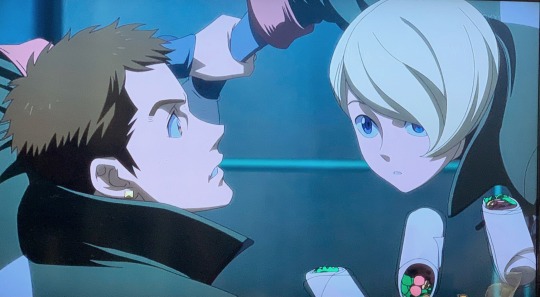
#gundam ibo#yamagi gilmerton#norba shino#tekketsu no orphans#shinoyama#I've been misty-eyed over these boys for days now
29 notes
·
View notes
Text
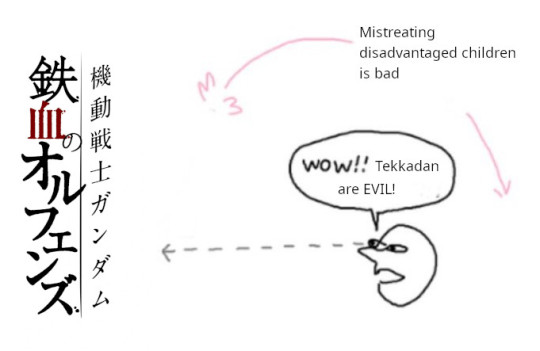
My low-effort contribution to the IBO fandom, several years late.
The message in it still stands, though.
#gundam iron blooded orphans#iron blooded orphans#mobile suit gundam iron blooded orphans#tekketsu no orphans#g tekketsu#... is that all the tags people are likely to use for this series?#gundam#meme#wow cool robot#am i going to regret this post?
53 notes
·
View notes
Text

king of mars
#orga itsuka#g tekketsu#iron blooded orphans#gundam ibo#tekketsu no orphans#mein arten#ibo#i swear back to regular scheduled char content soon i needed to get him out of my system
21 notes
·
View notes
Text
IBO reference notes on . . . queerness
How has it taken me this long to write about this aspect of the show? (He asked rhetorically, staring at the enormous amount of fanfic that basically stands as a thesis statement on how very queer this part of the Gundam franchise is [as opposed to all the other terribly straight parts, he added, sarcastically].)
Anyway, let's do it. Full spoilers up to the end of the show will follow, together with discussion of child abuse and exploitation, since that is what IBO is all about.
Special thanks to @lilenui and @prezaki for their invaluable assistance in locating sources.
Statement of caveats: this work is an amateur analysis of the English-language localisations (subtitled and dubbed) of a piece of Japanese media. I do not speak or read Japanese. I am myself bi, which qualifies me to be attracted to more of the cast than the average viewer, and have a working knowledge of LGBTQ+ history in the UK and USA, which tells me nothing about the cultural and historical context in which this anime was made. As such, I will not be addressing the behind-the-scenes production or the corporate mandates surrounding it but will focus narrowly on what I perceive to be present in the text (hereafter meaning both the script and animation, and any additional fictional details provided elsewhere).
Queerness in Gundam
Some background before we dive in. To my knowledge, the first character in the Gundam franchise to be intentionally depicted as LGBTQ+ is Guin Sard Lineford from Turn A Gundam (1999). An ambitious young aristocrat who spends the series on the line between hero and villain, he is infatuated with protagonist Loran Cehack and the show makes little attempt to play this as anything other than one man falling in love with another.
This is entirely one-sided and not appreciated on Loran's part, although that seems to have less to do with it being homosexual attraction than with Guin's high-handed and entitled attitude to life, filtered through heavily gendered social norms. For plot reasons, Loran spends several episodes cross-dressing as 'Laura Rolla', corsets and all, and Guin continues referring to him as 'Laura' long after the deception is no longer required, saying it 'suits him better'. Guin is eventually called out on this by a third character, who accuses him of forcing an idea of feminity on the other man rather than stoop to place himself in the position of a 'wife'. Objectifying Loran is presented as of a piece with Guin's overall flaws as a person, to whit, putting his own views about how things should be above the material reality and desires of those around him.
Guin is also the only explicitly gay character in the show (I'm honestly not sure how to classify whatever Dianna Soreil and Kihel Heim have going on, but it's certainly not labelled in the text). Therefore no counterpoint is provided to demonstrate healthy queer relationships. I don't state this to dismiss his inclusion: he forms part of a smart, nuanced plot thread, and Gundam creator Yoshiyuki Tomino had to fight to get Guin's homosexuality clearly included. But even so, Guin is a palpable step forward rather than a watershed moment, and the end result veers close to some nasty stereotypes about queer people imposing their desires on others.
There are other examples of characters transgressing gender norms in Turn A, most especially Loran's aforementioned cross-dressing. He is comfortable playing the part of 'Laura', in ways that mitigate viewing this situation as the extended joke it might be in another production. Funny moments do come up – particularly in the lead-in to his 'debut' as he acclimatises to the female attire of the show's pseudo-Edwardian setting and takes posture lesson – but he and the concept of a man in ladies' clothes are never made a subject of mockery. The same cannot be said for the character of Sochie Heim, whose attempts as a young woman to fulfil a gung-ho masculine role often turn comedic. This is part and parcel of her assaying militaristic modes of action, which are soundly mocked across the board. It nevertheless stands out next to Loran/Laura.
Further, Loran's status as a literal moon-child carries implications for his attitudes. His dismissal of existing social standards on Earth is very much presented as correct, and in keeping with what I know of Tomino's other writing and stated beliefs, but it dovetails unfortunately with a treatment of queerness as otherworldly, not something that may be found among an average population. We get another example of cross-dressing in the next-but-one series, Gundam 00 (2007, not a work Tomino helmed), where the usually male-presenting artificial lifeform Tieria Erde switches to a female presentation (in a ball-gown, no less) during a covert mission. This sufficiently parallels Loran's case, I assume it was a deliberate call-back, being as it is a disguise enacted by someone even less typical than a boy from the moon.
What I am driving at is that while Guin, Loran and Tieria may be characters who are queer or perform queerness in some manner, they do not necessarily represent an outright embracing of queerness as a mundane facet of everyday life.
Fast-forward to 2024 and the latest mainline Gundam show is a lesbian romance.
If you have been following my blog for a while, you will know I do not hold The Witch From Mercury in especially high regard. I think it is annoyingly messy, frequently half-baked, and, broadly-speaking, exactly as frustrating as I'd expect from the guy who wrote Code:Geass. It's still an explicit love story that opens with a clangingly blunt statement about the acceptance same-sex relationships and ends with the two female leads happily married to one other. For all its flaws, I genuinely think the central relationship between Suletta Mercury and Miorine Rembran is a nice piece of story-telling, not to mention admirably open about what it is doing. Like it or lump it, Gundam is gay now, properly, with a protagonist and co-protagonist who can be definitively labelled queer and whose romance appears entirely unremarkable for the setting (in terms of being same-sex; clearly there is a lot to remark upon otherwise).
I would be remiss if I did not mention that the conclusion of the series was accompanied by a certain amount of corporate arse-showing, with hollow attempts to walk back the ending seemingly for the sake of appeasing homophobic elements within and without the companies that produce Gundam. The frankly laughable nature of these actions stands testament to how unequivocal G-Witch is. It is flatly impossible in my opinion to interpret as anything other than flagrantly homosexual, and that's great.
Between this interesting but limited start and the full-throated present lies Iron-Blooded Orphans (2015), my absolute favourite and the show that got me writing slash fic after years of… not doing that. So: what is the deal with queerness in IBO?
Natural for a human
By my count, including all present spin-offs, there are three characters stated in-text as being attracted to people of the same gender (Yamagi Gilmerton, Iznario Fareed, Deira Nadira), two who are at the least open to the idea (Norba Shino, Mina Zalmfort), two whose mutual attraction is stated within the context of polyamory with a third person of the opposite gender (Atra Mixta, Kudelia Aina Bernstein), one whose sexuality is briefly hinted at (Chad Chaden), and one male character who is possibly not attracted to women (Orga Itsuka).
Let's get Iznario out of the way first, because the less time we spend on the actual paedophile, the better.
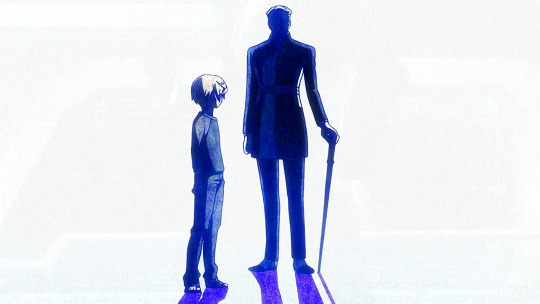
Lord Iznario Fareed is a rich, powerful aristocrat who sexually abuses young blonde boys and inadvertently sets large parts of the plot in motion as part of quasi-villain McGillis' backstory. In a lesser show, Iznario would be the embodiment of the 'predatory queer' stereotype Guin skirts the edge of. Here, however, he is very much not the only 'gay' character present and his proclivities demonstrate one of the many ways the world exploits vulnerable children, a core theme of the series. Early on, we see fleeting glimpses of young girls being pimped out on the streets of Mars. Iznario shows this social failing extends to the much richer Earth and although he is portrayed as the worst among the Gjallarhorn elite, they all abuse their power for personal gain. Thus, as much as the reveal of what he has done carries a certain shock value, it is not present purely for cheap impact. (This isn't the essay to discuss it, but the flashbacks to McGillis being abused as a child are a masterclass in how to frame such things around the victim, clearly communicating what's happening while avoiding gross voyeurism.)
I don't know how deliberate it is the canonical gay character who is shown in an entirely positive light fits the profile of Iznario's victims to a T, but it does underscore we're looking at a case of power allowing people to get away with hideous things, not a stand-in for queerness in general. To an extent I resent having to spell this out, since it seems so obvious Iznario is not fulfilling the role of a homophobic cliché. Sadly, the cliché exists and the point is worth discussion.
Moving swiftly on: Yamagi and Shino.
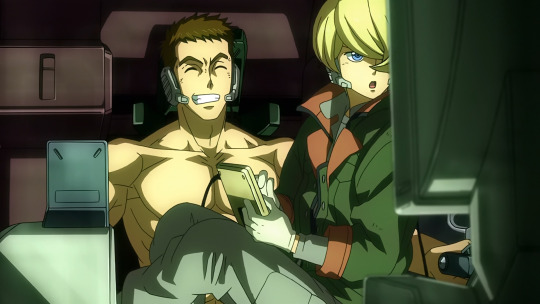
Yamagi Gilmerton is a small, quiet teenage boy with a somewhat withdrawn and acerbic personality, who spends much of Iron-Blooded Orphans nursing a hopeless crush on mobile suit pilot Norba Shino. Like the majority of the cast, Yamagi is a child soldier, but a mechanic rather than a combatant. Additional backstory commentary reveals that he struggled on joining CGS mercenary group due to his physique. Indeed, while this detail is not directly referenced in the anime itself, he is indeed drawn noticeably thinner than the other boys.
Again, we veer towards stereotypes, where a queer character is portrayed as weaker and more effeminate. Yet in spite of leaning this way in looks, Yamagi is an eminently capable person, never treated as lesser for fulfilling a support role rather than being a fighter. If anything, IBO goes out of its way to highlight how vital good mechanics are to mechanised warfare, and we see multiple examples of Yamagi being both assertive and kind of badass. At one point, he scales, unaided, an 18 metre tall mobile suit that's collapsed to its knees. When he and Shino are revisited in spin-off game Urdr Hunt (soon to be some form of animated production), he pilots a spaceship within an active battle-zone, flying escort for a damaged freighter as it retreats. In Season 2, he's comfortable ordering Tekkadan's new recruits around and is the first person to properly chew Orga out for his failings as a leader. Far from being an outlier among the protagonists, Yamagi is equally brave and dedicated to the cause, irrespective of his sexuality.
To be fair, he does tend to clam up and grow more awkward around the object of his affections. To be equally fair, he has the misfortune of having fallen for the most oblivious himbo on God's red Mars.
Shino is a big, boisterous warrior, the polar opposite of Yamagi in personality and physicality. He embodies Tekkadan's machismo, eagerly anticipating the chance to prove their strength and generally being a standard bearer for becoming the biggest, baddest group around. Things are not as straightforward as they seem on the surface, however. He shows a good awareness of when the group is in over their heads – going so far as to suggest retreat in the face of bad odds several times – and he is not nearly as sure of himself as he might first appear. He displays a wide streak of insecurity about his abilities as a soldier, reacting badly to people questioning his dedication or competency. And he crumbles completely when some of his comrades are killed as the result of a split-second mistake on his part, stating a wish to have died in their place. Thereafter, he acts in ways that read as choosing to take all the risks on himself rather than go through more loss. It makes him an interesting mix, someone who acts as a cheerleader, boosting everyone else's morale, while swallowing his own doubts and personal fatalism.
He is also presented as one of the most sexually active members of Tekkadan, using his wages to visit brothels to sleep with women. Indeed, he is frequently found extolling the virtues of the opposite sex, referencing collections of pornography (at least in the English dub), and generally being a very typical teenage boy about such matters.
Given this, you might assume Yamagi is longing hopelessly for a straight man. That is indeed the idea the show teases us with for much of its run (can something be straight-baiting? I feel if anything ever earned that title, it's this). OK, Shino's fond of Yamagi as a friend and frequently relies on his assistance in improving his fighting ability, and per ancillary material, is the one who got Yamagi transferred to the mechanics corps in the first place, rescuing him from struggling in the infantry. And sure, Shino spends an awful lot of time in very close proximity to Yamagi, including literally pulling him into the cockpit to assist with a mission. And yes, Shino is absolutely a flamboyant creature, sporting gold ear studs and an attraction to the colour pink, ensuring his mobile suits are painted all over magenta in order to stand out on the battlefield. And certainly, Shino is extremely empathetic, adjusting his attitude depending on his impressions of other people, such that he dials his boisterousness down in Yamagi's presence, displaying a far more gentle affection than he does with his other friends.
But clearly he hasn't noticed Yamagi is head over heels for him.
Right?
Well, towards the end of Season 2, during another moment where Yamagi is literally sitting on Shino's knee, Shino proposes the two of them drink together all night long once the fighting is over. Not only is this an unambiguously romantic overture (he's asking while pushing aside the fringe that normally covers half of Yamagi's face, in order to look into his eyes properly), it comes after a joke several episodes earlier in which Shino has to explain to a less worldly comrade that a girl inviting you for a drink is not a request to go out with the whole gang but a far more intimate gesture (I say explain, it's more expressing incredulity Akihiro didn't realise Lafter was asking him on a date). Later, it is revealed Shino did indeed work out that Yamagi 'likes' him (to his friend Eugene's exasperation that it took him so long to notice), and he reacted with amazed delight to discover there was someone in Tekkadan who'd fall in love with 'a guy like me'.

He'd assumed because Tekkadan is a family (a description provided by their ally Naze, which everyone just kind of runs with), romantic love wasn't possible between them. Having worked through this mental block and finally realised the blindingly obvious, he renews his desire to protect Tekkadan as long as he lives, refuting his previous view of himself as an expendable human shield and heading out with every intention of surviving all the way to the end.
And because IBO is an exquisitely-written tragedy, he is promptly killed while attempting a futile one-man attack against their enemies, his advances on Yamagi forming part of a long build-up whereby the boy who loves him provides the tools he needs to charge into a suicide run.
Right then. *drags out the reading comprehension soap-box* I have seen some people refer to this as an example of the 'bury your gays' trope, and there is nothing more likely to get me manifesting behind you in the form of an irate shoebill than to do likewise. 'Bury your gays' refers to a tendency for queer characters in fiction to disproportionately suffer tragic fates. This is a writing choice usually rooted in the idea queer relationships are inherently tragic, either because they are viewed as a perversion of 'correct' forms of love, or because of some misguided idea the prevalence of homophobia means queer joy is impossible. I am going to be charitable and concede this is indeed a case where one half of a budding homosexual relationship dies horribly. But, as always, the context matters.
All but one of the romantic relationships established prior to the epilogue of Iron-Blooded Orphans end in death. Of the two that survive in some capacity, one is a heterosexual background romance between two older characters and the other is a pair of women I shall be covering later. IBO is a story about child soldiers that does not shy away from the fact these are teenagers being fed into a meat-grinder. That the director's original intention of killing every named character was toned down (to the series immeasurable benefit, in my opinion) dos not change a narrative arc towards doom.
Within this, Yamagi and Shino aren't singled out for being queer. The coyness around Shino's eventually-evident bisexuality serves to generate an instant of hope and relief right before the rug is pulled from under everyone's feet. Where Shino's death does differ from those of other characters is in presentation: he dies alone and does not get any form of farewell or the passing-on moment afforded to others. But that is only to be expected, since we're talking about the point where it becomes clear there is no saving the situation. It's a cruel, abrupt moment of bad luck, puncturing the heroic idea of scraping victory at the last second. Shino flew out intending to live and he died anyway. A queer relationship forming part of what he was fighting for is an almost incidental detail.
(As an aside, I am aware of two other examples in Gundam fiction where a pilot and a mechanic have a doomed love affair. One is in Char's Counterattack, where a male engineer's romance with a female pilot ends with them both being abruptly killed, and the other is from Gundam AGE, where a female mechanic sacrifices herself for the greater good, leaving a male pilot to mourn her loss for the rest of the series. Shino and Yamagi reiterate this same concept.)
Stepping back from the tragedy, Yamagi's love for Shino is as delightfully underplayed as the other relationships in the show, with little emotional melodrama being wrung from the romance itself. Yamagi can't bring himself to declare his feelings, frequently turning cold instead and perpetuating Shino's misunderstanding of where they stand. Yet Shino ultimately proves enthusiastic for the idea, rendering moot any concerns Yamagi had over getting turned down (going beyond the text, a Q&A with the series' director confirmed Shino was written as bi). Equally, in the aftermath of Shino's death, Eugene comforts Yamagi by relating the truth of Shino's earlier realisation and even going so far as to rebuff Yamagi for implying there's something wrong with him for grieving. This and other interactions in the same episode imply those nearest to the pair were well aware of Yamagi's desires and had absolutely no problem with them. The prevailing attitude within Tekkadan is one of complete acceptance for its members and this is no different.
Indeed, for me, the most important part of how queerness is represented in IBO is that it is treated as just another aspect of the diversity of the cast. I've seen it stated that viewing homosexuality as a natural part of human existence was Tomino's motivation in making Guin gay. IBO presents us with the same idea, far more seamlessly and far more positively.
Now, let's leave the anime proper and look at the same-sex pairing from spin-off manga Iron-Blooded Orphans: Moon Steel.

Deira Nadira and Mina Zalmfort are part of the Gjallarhorn nobility and their marriage was arranged to strengthen relations between their two families. We see an example of a similar political match in the main show, where the heir to the Fareed family, McGillis, is betrothed to the second child of the Bauduins, the much, much younger Almiria. That this can take place regardless of the gender of the participants has big implications for the functioning of a bloodline-focused aristocracy. Presumably it indicates they are happy to use medical technology to ensure the Nadira family continues into the next generation, and if same-sex marriages are thus permitted, that means fewer factors to worry about when it comes to perpetuation. Whether male-male weddings are allowed too remains an open question; given the existence of real-world double-standards, it is possible Deira and Mina represent the only acceptable form of homosexuality. Nevertheless, that it is accepted speaks volumes. Gjallarhorn is not an especially progressive organisation, built as it is on rigid class structures and notions of human purity. Yet here we are.
Perhaps we should have expected that the norms around gender in this system don't correspond to strictly patriarchal patterns from the real world. Carta Issue, a key player in Season 1 of the anime, is the only child of the Issue Family's current leader and positioned as his sole heir, irrespective of the fact she's a woman. The logical inference is that any children of hers would count as Issues, rather than belonging to a potential husband's family. Deira is similarly the heir to her father's position, although intriguingly, it's not outright confirmed if she is his only child or simply the oldest. The possibility exists that gender is a non-factor in determining inheritance.
With respect to sexuality, Deira seems pretty obviously intended to be a lesbian. Her relationship with Mina is presented as one they are both happy with, despite it being an arranged by their parents, and Deira is depicted in the manual for Gundam Gremory's model kit as favouring the clothes of 'a handsome man'. She doesn't present that way within the manga' story, first showing up wearing the standard unisex Gjallarhorn pilot-suit, then wearing a formal gown for a meeting while in an official capacity. But she is depicted wearing masculine clothes in silhouette when initially mentioned and in a post-story panel at the back of the final volume.
(Another aside: the fan translations I use for this part of the manga refer to Deira using male pronouns when she's introduced. However, that could simply be down to the poor quality of said translation; she's consistently referred to using female pronouns in official materials and the game adaptation of this scene has her named as simply 'Lord Nadira', the standard appellation for Gjallarhorn family heads.)
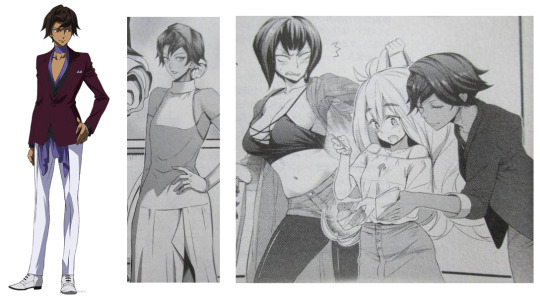
Whether Deira's code-switching is the result of institutional expectations around her role or personal preference, it adds extra texture to her depiction. While civilian garb was designed for the adult version of Carta and closely matches conservative gender expectations for a woman, she's never shown wearing it, so we don't have a point of comparison to judge what's required of a character in Deira's position.
Regarding Mina, you'll notice I grouped her with Shino rather than the characters whose sexuality I consider to be stated outright. With Shino, the nature of his sexuality is not put absolutely beyond question in the text. This is splitting hairs due to the overt nature of what's on screen but the fact remains, the anime doesn't clarify if his being open to Yamagi's love means he already thinks of himself as bisexual, or if this is something he hadn't considered before. With Mina, it's more a case that I'm unwilling to label her one way or the other based on the available information. Deira carries sufficient signifiers, I find little room for doubt over the intention. We also have an outright statement that she holds great affection for Mina regardless of being obliged to consider her an eventual romantic partner. Indeed, she becomes so upset by believing her fiance dead, she runs off to Antarctica in a Gundam. But the exact depth of Mina's feelings in return is not discussed.
In addition, Mina is considerably younger than Deira. McGillis and Almiria's match takes place when he is (probably) somewhere in his late twenties and she is nine, with plans for the union made four years prior. This is not great, to put it mildly, albeit fairly typical of how such things have historically worked for nobility. Based on appearances and how they are treated by the rest of the cast, I would assume Mina to be in her mid-teens, and Deira to be in her early twenties (annoyingly, exact ages are provided for several characters in Moon Steel, just not these two). A less dramatic gap (and I don't believe Mina is meant to be quite as young as her appearance perhaps suggests), yet still significant when one of the people involved is below what we'd consider adulthood.
There is no indication of anything untoward going on, within the confines of the situation, similar to how we're given no indication McGillis is abusive towards Almiria. Any comparisons with Lord Iznario's activities lie purely along the axis of how children are exploited by adults even without suffering directly. All indications are that Deira and Mina have made the most of something they have little choice in. Regardless, I still feel more comfortable describing Mina as open to being in a relationship with another woman, rather than pinning her to a specific preference.
Continuing the theme of things where doubt or ambiguity exist, let's discuss some characters were there shouldn't be any: Atra and Kudelia.
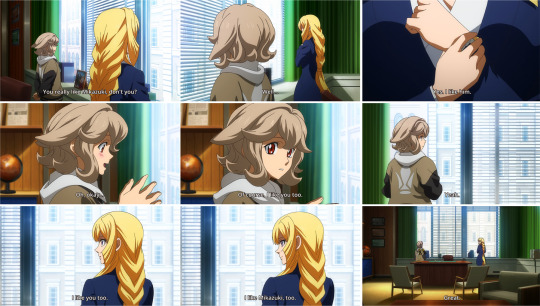
I don't know about you, but I find it extraordinarily hard to read this as anything other than a three-way love-confession. Still, in the interests of fair play, let's review the wriggle room for declaring this something else.
Kudelia Aina Bernstein and Atra Mixta are love interests of nominal protagonist Mikazuki Augus, in an iteration of another tried-and-true trope, that of a male lead inexplicably being attractive to the female characters in his orbit. Or rather, it would be if the show didn't take such pains to demonstrate why these girls fall for him, setting up a long-established crush on Atra's part (rooted in him being the first person in the world to be nice to her) and a mutual respect on Kudelia's that gets spurred to more when Mikazuki randomly decides to kiss her because she 'looked cute' (Mikazuki has the manners of a feral stray raised on the streets, because that's precisely what he is).
Justification aside, this has the makings of a traditional triangle, that is, one without a connecting base, which we might expect to be resolved by either Kudelia or Atra 'losing out'. For a few episodes, this does indeed seem where we are headed. Then Atra discovers the concept of polyamory via the polygamous Turbines group and all bets are off.

Having realised it is perfectly possible for a family to consist of multiple romantic partners, Atra proceeds to work towards ensuring everyone gets everything they want. Strictly speaking, this doesn't mean she is attracted to Kudelia as well – even if she clearly recognises Kudelia as an attractive person from the start and…
You know what? Acknowledging that the information about their eventual marital status was only stated in interviews at live events with no official record and seems to have been framed around raising the son Atra has with Mika, I'm going to abandon the pretence of both-sided objectivity and go straight for the throat. Turns out my patience for soft-footing this lasts about as long as it takes to say 'bi-erasure'.
Over the course of Season 1, Atra not only decides the end-game is some form of three-person wedding, she also:
Shows no jealousy over Mikazuki and instead chides him for not providing the correct emotional support to the girl he kissed.
Spends a great deal of time with Kudelia and enthusiastically throws herself into furthering Kudelia's goals, without necessarily understanding the technicalities.
Covers for Kudelia by pretending to be her during a confrontation with Gjallarhorn soldiers, getting herself soundly beaten up in order to prevent them from chasing after the real deal.
Drives an armoured car through a battlefield for Kudelia's sake, safely delivering her to a vital rendezvous.
Leaps in front of a massive mobile suit to push Kudelia out of its path, physically shielding the other girl with her body.
As much as it pains me to resort to the 'if this were a man and a woman, would it read as romantic' crudity – yes! Yes it would! Especially since in Season 2, Atra presents Kudelia with a good-luck charm bracelet she has woven, something she previously did for Mikazuki explicitly out of having a crush on him. I'm all for embracing platonic love (which is why Takaki and Aston are not featuring in this rundown) and there's nothing in the above list necessarily entailing attraction beyond deep friendship. But when Atra consciously repeats her actions towards Mikazuki (someone she goes on to definitely have sex with) with Kudelia and it leads to the scene between them where they declare how they feel about each other and Mikauki, looking for non-romantic angles takes more effort.
After all, if we are to read Shino's openness to Yamagi's affection from the things he says and how he looks saying them, we can certainly do the same for Atra and Kudelia's use of the word 'like' in reference to one another and their reactions to hearing it said of them. (Obligatory note that if there is some nuance in the original Japanese the translation doesn't capture, I'd love to hear about it. The English scripts, however, leave little to the imagination.)
It is indisputable that Atra feels a strong affection towards Kudelia and while I have been focusing on her a lot (she is by far the most proactive member of the triad), Kudelia reciprocates at every opportunity she is presented with. Even if there truly wasn't an intention to portray this as exactly equivalent to Atra and Mikazuki, the end result manages to be on par with Yamagi and Shino. Consider Kudelia and Mikazuki, for example. In terms of portrayal and the two-girls-one-guy trope being explored here, they have the same level of chemistry and the same absence of overt consummation as Kudelia and Atra, and it would hardly be a serious position to claim the show does not place the two of them in romantic conjunction, now would it?
You may at this point be wondering why I am getting so defensive of reading Kudelia and Atra as romantic partners. Honestly, I am too. On reflection, I think it's because IBO is playing around with such a worn-out and insipid means of wringing drama from characters who should know better, I keep searching for the catch. And yet there isn't one. This show really did respond to a nascent love chevron by having the mousy, homely girl tell the governor's beautiful daughter to shut up and get in the polycule, and turned it into a true triangle.
That's wonderful. I cannot properly express the wave of joy and relief that came over me when I realised this was the direction they were taking. It ends in tragedy, of course, Mikazuki giving up any chance of a peaceful life to die in battle, far away from the women who love him. But their lives continue because of his sacrifice and by all appearances they remain together. In some ways, for the overarching message of hope persisting on the back of heartbreak, the precise details of that arrangement don't particularly matter. So why not take the gayest reading possible?
What an excellent segue into a blink-and-you'll-miss-it, probably-stretching-too-far, nonetheless-compelling potential bit of queerness: Chad in the series epilogue.

One of the many tertiary characters in Tekkadan, Chad Chaden has minor speaking parts throughout Season 1 and a larger role in Season 2. He initially appears during a particularly dire early moment when it looks like everyone is about to be killed by attacking mobile suits. His obvious resignation to this fate sets the tone for a rather dour personality, at least while on the clock. Chad starts out as human debris, a person enslaved after a space battle and sold to the CGS military group as free labour. This gives him a very matter-of-fact attitude towards fighting and the kill-or-be-killed nature of being forced into it – he voices the sentiment that even when facing other human debris, they can't afford to show mercy.
Off the clock, Chad displays a more sensitive personality. He seems studious, learning about interplanetary communications from Kudelia's maid Fumitan and later being promoted to leader of Tekkadan's Earth branch. He has some difficulty acclimatising to being treated as a free person, proving unsure about the concept of wearing a smart suit instead of his normal fatigues. And he grows anxious when he returns to Mars to discover nobody told him two of the few adults in the group (Yukinojo and Merribit) had started dating, worrying that he's no longer 'one of the guys'.
The most we learn about his relationship preferences prior to the series epilogue comes in a comedic sequence about a third of the way into Season 2, when Shino suggests a trip to a local brothel. Eugene responds by proclaiming that he's realised money will not buy him true love. This prompts Chad to ask Merribit if this is true and, on her saying she supposes so, opts out of the trip as well. Judging by his body-language in the next frame where he appears, this is possibly a decision he regrets – perhaps owing to his anxieties, since he just passed up the chance for some team-bonding.
None of this is directly relevant to the topic of this essay. If anything, the scene I just described suggests that, like Eugene, Chad has previously gone along with Shino in paying for sex with women, only to discover he wanted more than just physical intimacy. But then we get the exchange in Kudelia's office during the last episode, following a time-skip after Tekkadan's defeat and dissolution. Now working for Kudelia as an assistant of some kind, Chad notes that Merribit is shortly to give birth to her and Yukinojo's second child, saying he and Yamagi intend to meet up later to plan a celebration. Eugene reacts with amused disbelief, accusing them of just wanting an excuse to go out drinking, to which Chad retorts, 'what's wrong with that?'
And the thing is he's blushing when he does. Which may simply be because Eugene is accusing him of slacking off – IBO characters blush all the time and their embarrassment is frequently to do with being caught acting immature or otherwise against how they want people to see them. But given the weight that 'drinking the night away' carries in regards to Yamagi following Shino's actions shortly prior to his death, it is easy to speculate this represents something more specific.
As far as I can recall, Chad and Yamagi do not interact at all over the course of the show's two seasons, meaning these lines present a rather unexpected combination of characters. Eugene would have seemed a more likely candidate to associate with Yamagi. He's positioned as Shino's closest friend, he comforts Yamagi over his grief, and they are together for much of the climax to the series' plot. So what has happened in the years since, that Eugene's teasing should elicit a blush from Chad instead?
If we put on our shipping goggles, it's far from a nonsensical pairing. Chad goes through an arc not too dissimilar to Shino's. He is knocked into a coma while protecting an ally from a bomb blast and subsequently the Earth branch gets swept into a war orchestrated by one of the factions within Gjallarhorn. On recovering, he blames himself for the many deaths that result, echoing Shino's line about thinking it better if he'd died in place of his comrades. On returning to Mars, he jumps head-first into mobile suit training, determined to make up for his perceived failure as a leader and cheering himself up through rigorous activity. Different though their personalities appear on the surface, there are clear commonalities here. Further, Chad's responses to his traumatic experiences have a more measured quality to them than Shino's. He is not nearly as reckless and provides clear directions to his comrades even while acting as a decoy against a dangerous enemy, rather than abandon any attempt to be an effective leader. Taken together, and coupled to a more long-term view of romance, these qualities might make him a 'safer' version of things Yamagi loved about Shino, creating space for them to be drawn together.
Or perhaps they're simply the most logical points of contact between the ex-Tekkadan survivors at the Admoss Company and Kassapa Factory and intend to make that an excuse to get companionably plastered for no greater reason than it being a nice time. I am speculating over a couple of lines and an animation choice. Nevertheless, it does not feel like unreasonable speculation. When we already have a veritable gaggle of characters who are queer or may trivially be read as such, it's hardly a stretch to assume one more.
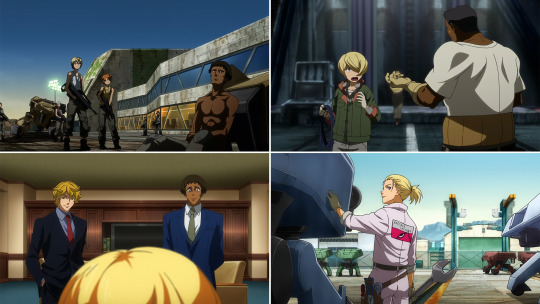
Chad/Yamagi doesn't appear to be a thread the fandom at large has pulled on much, likely because the pairing of Shino and Yamagi is so prominent, it eclipses a mere throwaway possibility. But I'm glad it exists within easy reach. And even if we take off our goggles, these lines demonstrate life for the characters has not stopped. The ex-slave and the gay kid are not stuck, trapped by the tragedies of their past. They have instead grown in both confidence and happiness and now have peaceful, stable lives where they're on going-out-drinking terms. That above all is why I wanted to explore this exchange: it reinforces Iron-Blooded Orphans' rejection of the idea the suffering people like Chad and Yamagi go through is perpetual or inevitable.
OK, one more character to look at. Let's talk about Orga and asexuality.
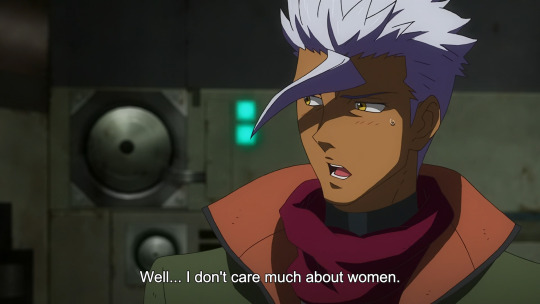
Orga Itsuka, leader of Tekkadan and instigator of the series' events, is notable for his charisma, his drive to provide a safe home for his comrades, and his complete unsuitability for the grown-up activities he attempts. Trying to party all night leaves him puking up his dinner. He forces himself into a suit and tie to handle the administration of a break-out paramilitary company, despite finding it stultifying and bewildering. His goals spin like a weather-cock, as he's surrounded by older characters possessing strong convictions while unable to stick to his own. And he is ultimately undone by an unwillingness to ask for help, having assumed that, as leader, he must decide everything alone.
I suspect his expressed lack of interest in women is intended to help convey overall immaturity. Orga is a good soldier and tactician, but he plainly isn't prepared for adulthood, lacking the grasp on the complexities of life that implies. Making him uncomfortable about sex serves to heighten the impression of a teenager trying to navigate circumstances for which he's not yet ready.
Relatedly, it should be stressed Orga stating he 'doesn't care' about woman is a response to Eugene asking if he agrees love and kindness are what's important, as opposed to Shino's endorsement of boobs. On hearing this response, Eugene proceeds to mock his commander for inexperience. That he himself has only just had his first sexual experience with another person and previously said much the same about not caring about sex simply proves hypocrisy is a fundamental aspect of Eugene's characterisation. The whole scene is very teenage.
Matters have not improved much when Orga and Eugene's dynamic is revisited in one of the side-stories released via the Iron-Blooded Orphans G mobile game. A year and change later, Eugene continues to act superior about having 'experience' where Orga doesn't.
Orga takes this rather poorly.

(Subtitles by @trafalgarlog)
Eventually Merribit has to shout at them to stop being brats, shaming them for behaving like argumentative children. It's funny – and then you remember they basically still are children and this is headed towards more carnage that will not spare them for being young. Such it is to engage with Iron-Blooded Orphans.
What does any of this tell us about Orga's sexuality? In principle, taking it as a device to convey immaturity, nothing. Orga's persisting virginity could simply mean he's not worked out this aspect of himself yet. He is a busy young man who likely hasn't had the time to try.
Alternatively it could mean he is gay. Mikazuki/Orga is an extremely popular ship in the fandom and we might take Orga's professed lack of interest in women as 'evidence' of him swinging the other way.
Or we could take my view, that Orga is asexual and his embarrassment is rooted in just not getting what the big deal is.
To immediately clarify, I don't think he is ace because he 'hasn't worked out what he wants', I think he's ace because he blushes on admitting he doesn't care about women and does not try to prove otherwise once he's in a position where he could easily do so. In circling back to the same joke for the side-story, the writers portray Orga as continuing to be uninterested in sex and sensitive over being needled about it. Again, a feasible interpretation is that he's into guys. Yet this is an argument with Eugene, whose response to the idea of Yamagi being in love with Shino is basically 'you mean you didn't notice?' Eugene is a dork and jerk; he isn't bigoted. None of the Tekkadan guys are. It's unclear if homophobia is even a factor in the setting. Sexism is, but when someone as superficially macho as Shino is comfortable with male/male attraction, and there are same-sex weddings inside Gjallarhorn, we cannot assume stigma exists around being gay. So why should Orga be worried, unless it goes beyond a question of who you're attracted to and into the answer being 'nobody at all'?
When you're surrounded by people who happily wax lyrical about how the joys of sex make you a real man, the absence of a libido might easily become a sore point.
Again, I'm supposing. Again, there is room to do so. As I touched on with Chad, it is easy to read queerness into the text when the assumption of straightness has been taken away, which is something this show does wholeheartedly and deliberately.
Orga Itsuka is one of the first characters I looked at and realised, not only shouldn't I assume heterosexuality, I shouldn't assume sexual attraction at all. I cannot credit Iron-Blooded Orphans alone with this. I do credit it with being a piece of media that applies itself to inclusiveness in ways quite remarkable for a show about giant robot fights, produced to market toys.
The word we want here is 'normalisation'. IBO has a lot to say about what constitutes 'normal' and a lot of it accords well with my own views, particularly those that have me twitching whenever anybody demands we 'be normal' about something. Normality is horrible. It is cruel and it is callous. 'Normal' is a world run on exploitation, on slave labour and on police savagery. Normal is children forced to risk their lives to earn the money required to feed themselves, because it is normal for their parents be gone, or incapable of supporting them. War is normal. Corruption of political systems is normal. Death coming more rapidly for those deemed expendable by society is very, very normal.
But so is protest. The drive to do something, to change things. The capacity for caring about each other. Love. 'Normal' is just a statement about what surrounds us every day, for worse and for better. In too many pieces of fiction, normality is narrowed, rendered a neater, cleaner picture, often excluding the kinds of people we might run into on the street, or walk past, or see on the news, distant and dehumanised.
Queerness is normal, yet for a long time it has been one of the first things to be cut out of fictional worlds. And when it is present, it's a big deal. An object lesson or a cry of triumph over breaking free of unfair strictures. I love stories about queer joy and victory. Heck, I'm a sucker for a good, soppy gay romance. But these aren't the only kinds of stories we tell. Sometimes we need to reflect the worst aspects of the world and what it does to normal people.
In attempting this, Iron-Blooded Orphans commits to an idea of 'normal people' that includes those who are gay or bisexual, those of colour and those we'd call white, the polyamorous, the illiterate, the desperate, the powerful, those who throw themselves into the fight with everything they have, and those who are simply kind. Those who are accepting, understanding and compassionate. Those who need to be accepted, who struggle to be understood, who suffer for a lack of compassion.
There are all sorts of people in IBO and – as a certain cheery, violent dumbass once said – man do I love it. I don't believe it is reading against the spirit of the thing to imagine more diversity than gets outright stated, to interpret one of the leads as ace or suppose another side character is bi or pansexual. It would seem entirely natural if they were.
Everyone's welcome here, down among the debris and the bloodshed, where hope is precious and fleeting and still somehow endures. So why shouldn't we raise a few extra pride flags?
Queer as in 'fuck you'
This all said, taken as a whole, Iron-Blooded Orphans is not a story about queerness or queer romance. Nowhere is this clearer than in its ending.
I skipped over the framing of the final scenes of the anime when I discussed Kudelia and Atra. They form a striking contrast with the ending of The Witch from Mercury, where the conclusion is directly focused around Suletta and Miorine's love for one another, their bonds of wedlock, and the happiness they have found together. This follows from the show being primarily about their relationship. In Iron-Blooded Orphans, the ending focuses not on Kudelia's feelings toward Atra, but those she has for Akatsuki, Mikazuki's son, with Eugene even saying she's eager to go see 'the man she loves', setting up a brief moment of uncertainty over who the character with Mikazuki's outline actually is.
The nature of Kudelia and Atra's relationship post-time-skip is implied rather than stated: in the English versions of the script, they do not refer to each other using terms suggesting they are married, although Atra has dropped her habitual 'Miss' from the front of Kudelia's name. They do not have wedding rings (redundant as those would be alongside the charm bracelets) and Akatsuki does not call Kudelia 'mom'. That they are raising him together is suggested very strongly, in line with Mikazuki asking Kudelia to be guardian of his child if he died. There are non-romantic ways of taking this idea, though, and none of these are closed off as viable interpretations.
But why should we expect some definite statement about romantic status when the point being conveyed is how Tekkadan's legacy continues to shape the world? This is a story concerned with the exploitation underpinning the world and the effort required to make even the smallest wide-scale change. It is about how people trapped at the bottom of the pecking order are still people, still human, messy and complex. It is about their pointless deaths, they ways they struggle on until those deaths come for them, and why they matter, even if the world forgets them.
Mikazuki, the living weapon, the human sacrifice for Orga Itsuka's reckless ambitions, leaves behind a child who will grow up in a more peaceful time, in a society slightly better off than when he and Orga were starving on Chyrse's streets. He doesn't live to see it; Akatsuki does. For all the failures, the attempt wasn't a waste. Don't you dare disrespect the people who died by saying it was.
This is where the epilogue centres, on Akatsuki and on Kudelia's cherishing of the world Mikazuki and everyone else built. Atra and Kudelia's relationship is there, a part of the gentler life they now have (Atra's desires were always towards the version of her existence where Mikazuki retires to a farm; here she fulfils the dream with Kudelia alone). It just doesn't need to take up space for the ending to land.
Yet, as I pour over how queerness is incorporated into Iron-Blooded Orphans, I find myself considering the struggles queer people face in reality. The victims of the AIDS crisis, dehumanised by indifferent institutions. Section 28 and the attempted destruction of knowledge around non-heterosexual forms of love. Riots and campaigns, voices raised loud and proud. How we are equated with dirt and corruption, reduced down to facts others find disgusting. The name-calling. The petty, pathetic posturing that makes everyday existence pointlessly harder.
So it goes for space-rats and degenerates alike.
I am lucky. My life is about as far from that of a child soldier as it is possible to get. My sexuality has been largely invisible. My gender matches the one most favoured by my society. I still have more common cause with those born in poverty on the other side of the world than I will ever have with the aristocrats and billionaires who shape the direction of my country. Because we hold many causes of misery in common. Because we share the same capacities for joy and suffering. Because our humanity is so easily cast aside by those we will never be able to touch.
There is always a place for stories uncomplicatedly about queer love conquering all. Equally, it is important to recognise the places queerness overlaps with stories about the many other ways the world casts people out. It is vital to be able to explore loss, futility and heartbreak. It is essential to capture why we strive onwards despite how heavily tragedy might weight us down.
We may be doomed. Our lives still matter. To ourselves, to each other and, whether they remember or not, to those who come after us.
So, no: for all the queer characters it contains and the many more we might trivially imagine queerness into, Iron-Blooded Orphans is not gay in the vein of The Witch From Mercury. It is not a happy story.
But it is a tenaciously hopeful one and, from certain angles, that alone looks queer as hell.
---------
Happy UK/US Pride Month – in honour and memory of Marsha P Johnson and everyone else who refused to go quietly.
I shall leave you with one of the least straight things ever to be included in any Gundam show.

[Index for further writing]
#gundam iron blooded orphans#gundam ibo#g tekketsu#tekketsu no orphans#gundam#turn a gundam#reference#notes#queerness#queer love#queer characters#analysis#spoilers#queer is a reclaimed slur and a term I apply to myself#heaven help you if you think this is the place to argue about that
98 notes
·
View notes
Text

#gundamgif#gundamedit#gundam ibo#g tekketsu#gundam#mobile suit gundam iron blooded orphans#gundam iron blooded orphans#amida arca#akihiro altland#hyakuren#graze custom#cw flashing#♃.gif
17 notes
·
View notes
Photo
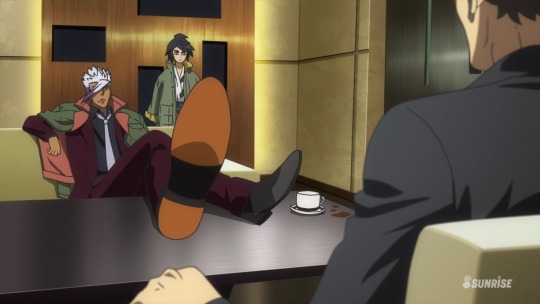
#anime#screenshot#mobile suit gundam: iron-blooded orphans#機動戦士ガンダム 鉄血のオルフェンズ#iron-blooded orphans#g-tekketsu#gundam ibo#gの鉄血#gundam#ガンダム#orga itsuka#オルガ・イツカ#mikazuki augus#三日月・オーガス#like a boss
26 notes
·
View notes
Text


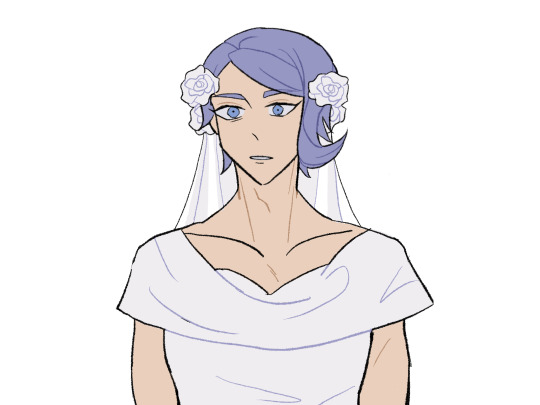
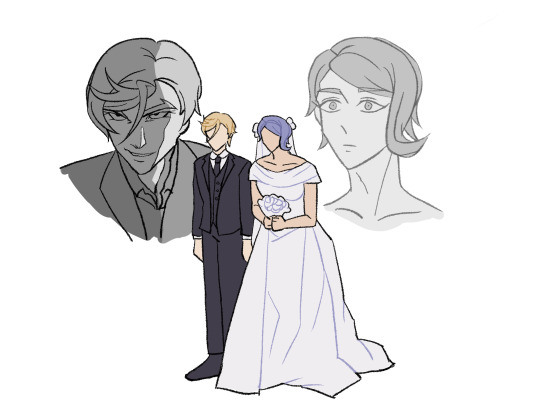
happy late pride. mcgillis says lgbtq rights
#this was funnier in my head#anyways i really think them getting married could realistically fix everything and save everyone. in this essay i will#mcgae#makugae#mcgillis fareed#gaelio bauduin#mobile suit gundam: iron blooded orphans#gundam iron blooded orphans#iron blooded orphans#gundam ibo#g-tekketsu#kytriesart
287 notes
·
View notes
Text
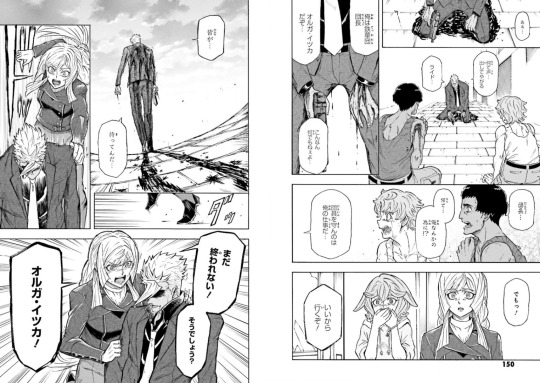

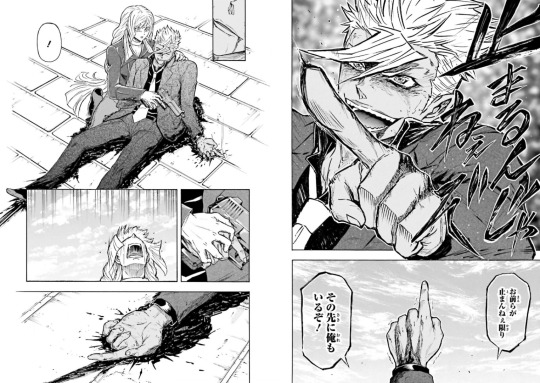
Terrible news! I've found the raws for the IBO manga volumes and I downloaded the last volume! the pics are a little pixelated but beggars can't be choosers you know? what's important is the fact that manga artist Kazuma Isobe chose violence and modified Orga's death scene so that he dies in Kudelia's arms
but wait! that's not all! there's also pages after they've brought Orga's body inside, and you get to see that Ride has the gun now
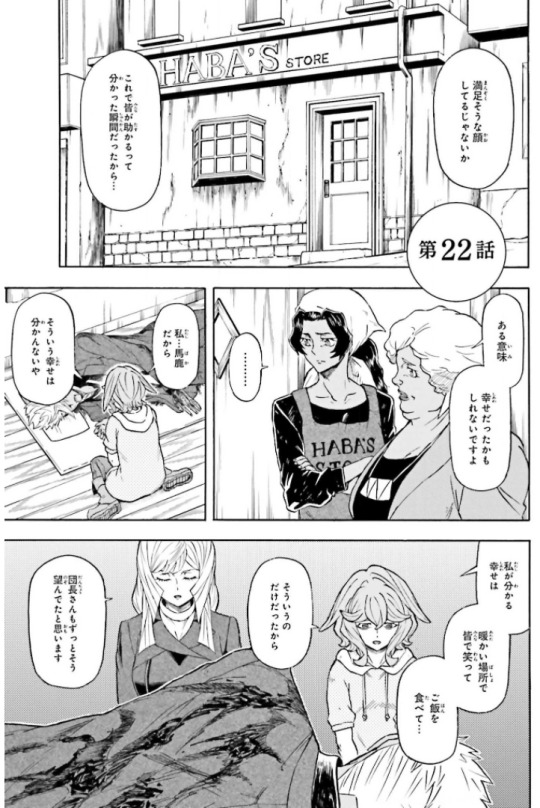
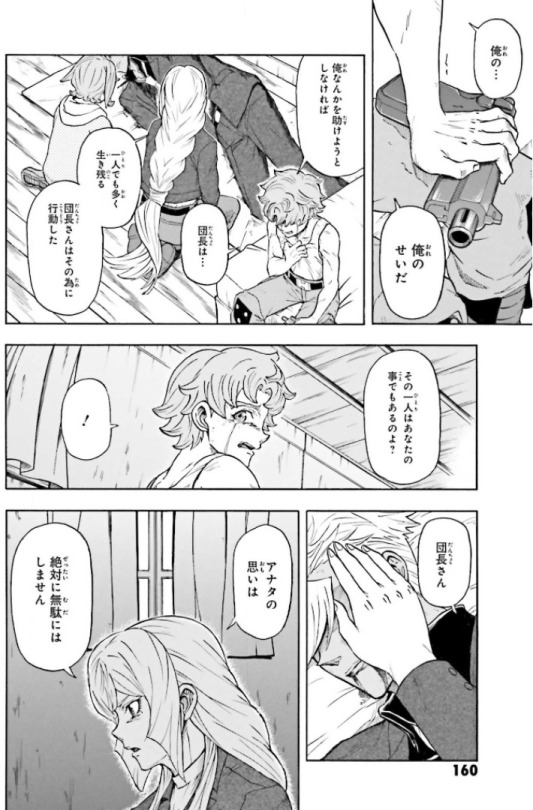
(everyone else's death in this last volume plays out the same, from Shino's to Mika's)
#gundam ibo#g tekketsu#gundam iron blooded orphans#iron blooded orphans#toonami#yes im tagging toonami in this#johnny and cherami woulda owned this scene#imagine the emotional devastation *-*#i might download the other volumes later#but for now join me in reliving the IBO Trauma (tm)#orga itsuka#kudelia aina bernstein
43 notes
·
View notes